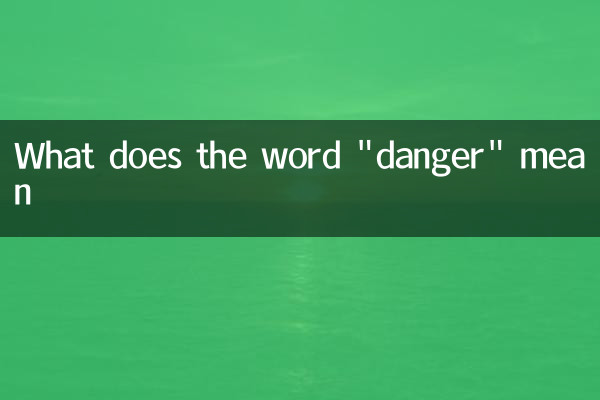What does the word "danger" mean
In Chinese, the word "门" is a polysemous word that has both practical and abstract meanings. This article will analyze the content related to "surprise" from the shape, meaning, usage and popular topics in the past 10 days to help readers fully understand the connotation of this word.
1. Basic explanation of the word "danger"

The pinyin of the character "无" is xiǎn, the radical is "阝" (next to Fu), and the total number of strokes is 9 strokes. Its basic meanings include:
| Meaning Classification | Specific explanation | Example sentences |
|---|---|---|
| Terrain danger | Refers to places with a steep terrain and difficult to pass through | "The difficulty of Shu Road is as difficult as climbing to the blue sky. I look west and sigh." - Li Bai's "The difficulty of Shu Road" |
| Danger | Situations that may cause damage or disaster | “This expedition is full of dangers.” |
| insidious | Describes a person's inappropriate mind and hidden evil intentions | "He is sinister and cunning and cannot be close friends." |
| Insurance | A risk management method | “I bought personal accident insurance.” |
2. "Surprise" among popular topics across the Internet in the past 10 days
By analyzing recent online hotspots, we found that the word "surprise" appears in hot topics in many fields:
| date | Hot Topics | Content involving "insurance" | Popularity index |
|---|---|---|---|
| 2023-11-15 | A landslide in some places | Rescue and rescue work continues | ★★★★☆ |
| 2023-11-18 | New financial regulation regulations | Strengthen risk management in the insurance industry | ★★★☆☆ |
| 2023-11-20 | A star was almost cheated | Revealing new types of telecommunications fraud | ★★★★★ |
| 2023-11-22 | Sports Events | Athlete narrowly defeated his opponent with injuries | ★★★☆☆ |
3. The cultural connotation of the word "danger"
"Danger" has rich connotations in Chinese traditional culture. Lao Tzu's "Tao Te Ching" contains the dialectical idea of "Disaster is where good fortune is relied upon, and good fortune is where bad fortune is hidden", which reflects the philosophical view that danger and opportunity coexist.
In modern society, the word "danger" is more widely used. From the booming development of the "insurance" industry, to the business practice of "venture investment", to the awareness of "risk aversion" in personal life, the word "insurance" has penetrated into all aspects of social life.
4. How to correctly understand and use the word "danger"
1.Distinguish between praise and criticism:The word "门" may be divided into praise and criticism in different contexts. For example, when "steep" describes natural landscapes, it is a neutral word, while "sincere" is an obvious derogatory word.
2.Degree of grasp:The degree of danger represented by "hazard" can be reflected in the modifier. Such as "extremely dangerous", "slightly risky", etc.
3.Pay attention to matching:The word "门" is often combined with other characters into words, such as "门", "门", "门", etc. Pay attention to the use of fixed combinations.
4.Professional Terms:In the fields of insurance and finance, the word "insurance" has a specific meaning, such as "life insurance", "property insurance", etc., and it is necessary to accurately understand its professional meaning.
5. Idioms and common sayings related to "risk"
| Idioms/Common Words | explain | Example sentences |
|---|---|---|
| Turn danger into a barrage | Turn danger into peace | "After full rescue efforts, the doctor finally pulled the patient back from the brink of death and saved him from danger." |
| Take risks | Take risky actions when there is no way out | "With his desperate situation, he had to take risks." |
| Dangerous phenomena | Describes dangers that keep emerging | "This time we climbed the mountain, we almost encountered danger several times." |
| If you don't enter the tiger's den, how can you get a tiger's son | A metaphor for not being able to succeed without going through hardships | "Although doing this is very risky, if you don't enter the tiger's den, how can you get a tiger's son?" |
Through the above analysis, we can see the rich connotation and wide application of the word "沪" in Chinese. Whether it is daily communication or professional field, it is very important to accurately understand and use the word "safe". In real life, we must not only enhance our awareness of risks and take preventive measures, but also learn to find opportunities in crises to achieve the state of turning danger into safety.

check the details

check the details